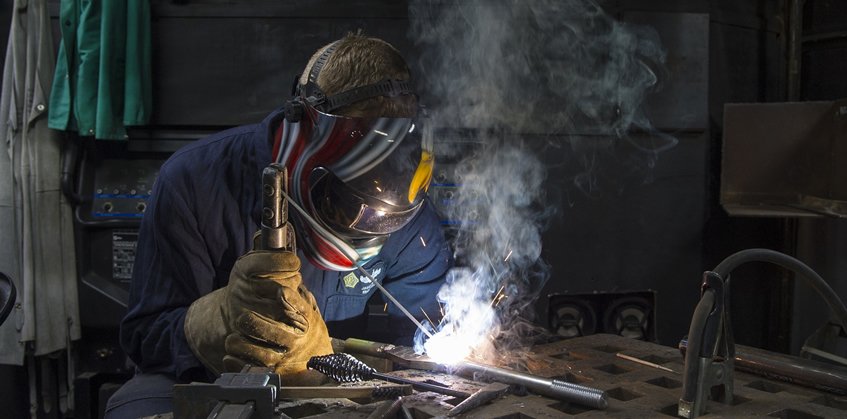
You don’t have to look very far to see evidence of an increasingly automated world. From the grocery store to retail shops, it may feel like the “rise of the machines” will make the human workforce obsolete sooner than expected. Many aspects of the manufacturing industry are already largely automated, leaving some to wonder what kind of effect that will continue to have on the welding industry.
The reality is that although robotic automation has replaced many functional aspects of manufacturing and assembling processes, there are many reasons why it is still not sophisticated enough to completely displace the welding industry. Robots are ideal for tasks that are highly repetitive and simple in scope, where speed and efficiency is a driving factor. But humans still outperform robots on projects that require complex decision-making, lower-volume technique or any degree of customization.
COMPLEXITY
Robots can be programmed to complete a task that is very narrowly defined in scope. Once a new task is needed, the machine has to be reprogrammed, which can be difficult and expensive. Welding robots are only economically sound for huge operations performing the same assignment repeatedly, such as in auto manufacturing plants. But many welding jobs won’t be suitable for that due to their complexity. In the shipbuilding industry, robotic welders are used for the very specific and low-profile task of welding ship hull blocks together. But when it comes to manufacturing the rest of the ship, so many different types of welds are needed and in different settings that even the most advanced ship building companies still rely on humans for these more complex tasks. Humans are still better-equipped when varied individual tasks with different requirements are needed.
VOLUME
Robots are still a very expensive solution even when it comes to automated tasks. Many manufacturing and welding tasks simply won’t justify the huge expense of a robotic solution when a human one is more cost-effective and versatile. Welding often involves fine motor skills and quality technique that robots simply can’t match. In addition, pipeline or construction welding can often involve access to tight or difficult spaces, not to mention the need to repair equipment on the spot, things that are still much better suited to the human workforce.
CUSTOMIZED DECISION-MAKING
While the programming side of robotics is currently an expensive limitation, one day that it may not be as advancements in artificial intelligence continue. Artificial intelligence, the ability of computer systems to perform tasks that normally require human intelligence, will definitely shape the future of robotics. Smarter machines may one day be able to program industrial robots, a job currently handled by humans, through computerized instruction or “learning” from other machines. Of course, the “smarter” the robot, the more expensive it will be to implement which may keep this a financially prohibitive technology for a while.
With the rapid advancement of technology across the manufacturing, aerospace, shipbuilding and other industries, the demand for welding jobs within those will certainly be impacted—but in a positive way. In fact, the U.S. Bureau of Labor Statistics expects that the demand for welders will increase 6 percent annually through 2026. That’s encouraging news for the welding workforce. They are still far better suited than robots are for welding jobs and likely will be for some time.
Is a Rewarding Career in Welding Technology Right for You? Get More Info…
If you’re interested in learning more about a career in Welding Technology, fill out the form on this page to receive more information. A friendly Beal University Career Advisor can answer career questions, guide you to our virtual tour, and get you helpful financial aid information. Get the answers you need to discover the perfect career path for you.
For immediate questions, call 207-307-3900
